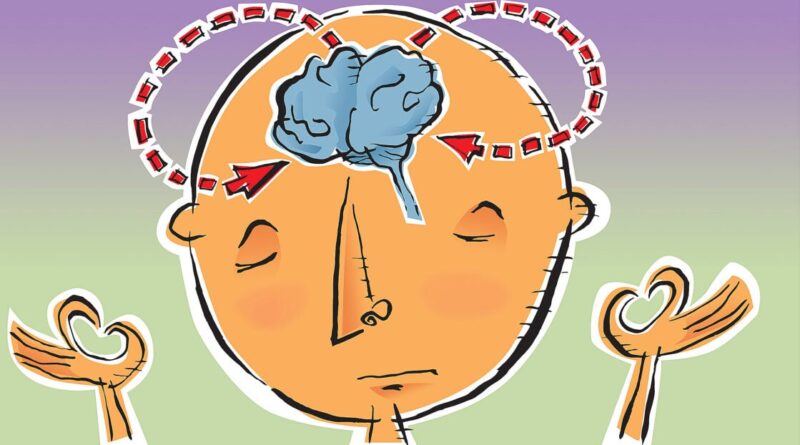How Mindfulness-Based Stress Reduction Affects Your Brain
Have you ever wondered how mindfulness-based stress reduction affects your brain? It’s a fascinating topic that has gained a lot of attention in recent years. Mindfulness-based stress reduction is a technique that involves focusing your attention on the present moment and accepting it without judgment. So, how does it actually affect your brain? In this article, we’ll delve into the details and explore the scientific research behind mindfulness-based stress reduction.
When you practice mindfulness-based stress reduction, it can actually lead to changes in your brain structure and function. Studies have shown that regular mindfulness practice can increase the gray matter density in areas of the brain responsible for memory, learning, empathy, and emotional regulation. It also appears to strengthen the connections between different regions of the brain, enhancing overall brain efficiency.
Furthermore, mindfulness-based stress reduction has been found to decrease the size and reactivity of the amygdala, which is the part of the brain involved in the stress response. By reducing the amygdala’s response to stress, mindfulness-based stress reduction can help decrease feelings of anxiety and improve emotional well-being. It has also been shown to activate the prefrontal cortex, the part of the brain responsible for executive functions such as attention, focus, and decision-making.
In conclusion, practicing mindfulness-based stress reduction can have a profound impact on your brain. It can lead to structural changes, enhance brain connectivity, and improve emotional well-being. If you’re interested in learning more about the topic, keep reading our article to discover more in-depth information and scientific insights on how mindfulness-based stress reduction affects your brain.
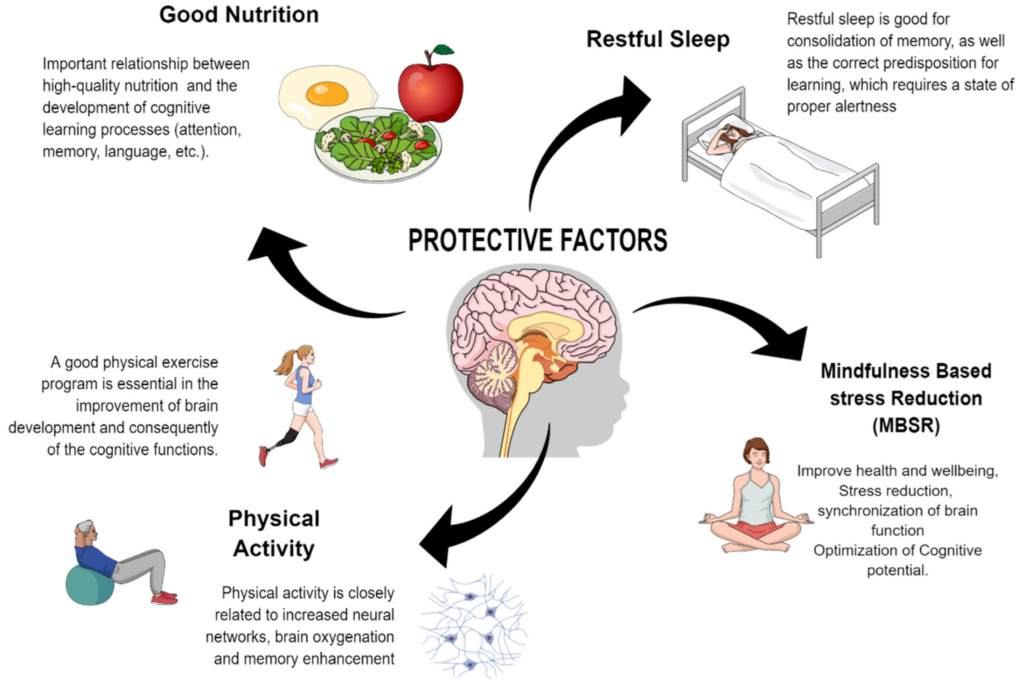
What is Mindfulness-Based Stress Reduction?
Mindfulness-Based Stress Reduction (MBSR) is a program that combines mindfulness meditation and yoga to help individuals manage stress, reduce anxiety, and improve overall well-being. It was developed by Dr. Jon Kabat-Zinn in the late 1970s at the University of Massachusetts Medical School. MBSR has since gained recognition and popularity worldwide for its effectiveness in promoting mental and physical health.
Definition of Mindfulness-Based Stress Reduction
MBSR can be defined as a structured program that teaches individuals how to cultivate a state of mindfulness, defined as paying attention in a particular way: on purpose, in the present moment, and nonjudgmentally. Through various mindfulness practices such as meditation, body scan, and gentle yoga, participants develop skills to increase awareness and acceptance of their thoughts, emotions, and bodily sensations.
Origin and development of Mindfulness-Based Stress Reduction
Dr. Jon Kabat-Zinn developed MBSR with the intention of providing a non-religious, evidence-based approach to support individuals in managing stress and improving their quality of life. Drawing from his own personal experiences with mindfulness practice and his scientific background, Kabat-Zinn began offering the program to patients suffering from chronic pain and stress-related conditions.
Over time, MBSR gained recognition as an effective intervention for stress reduction. Its impact led to the development of numerous research studies exploring the benefits of mindfulness meditation and the techniques used in MBSR. As a result, MBSR is now widely regarded as a valuable tool for cultivating mindfulness and reducing stress.
Key principles and techniques of Mindfulness-Based Stress Reduction
MBSR is based on several key principles and techniques that form the foundation of the program. These include:
-
Mindfulness Meditation: Participants engage in structured meditation exercises that involve focusing their attention on specific objects or sensations, such as the breath or bodily sensations. Through regular practice, individuals learn to observe their thoughts and emotions without judgment or attachment.
-
Body Scan: This technique involves systematically scanning the body’s sensations from head to toe, paying close attention to any tension or discomfort. By cultivating awareness of bodily sensations, individuals learn to develop a more intimate connection with their physical experiences.
-
Gentle Yoga: MBSR incorporates gentle yoga postures and movements to help individuals connect their minds and bodies. These yoga practices cultivate mindful awareness of one’s physical self while promoting relaxation and flexibility.
-
Mindful Movement: Participants engage in simple movements, such as walking or stretching, with a focus on being fully present in the moment. This practice enhances the integration of mindfulness into daily activities.
-
Group Discussion: Sharing experiences and reflections with fellow participants is an integral part of MBSR. Group discussions provide support, insights, and opportunities for individuals to learn from each other’s experiences.
Effects of Mindfulness-Based Stress Reduction on the Brain
Understanding the brain’s response to stress is crucial in appreciating the impact of MBSR on brain structure and function. Chronic stress can have detrimental effects on various brain regions involved in emotional regulation, cognitive functions, and overall well-being. MBSR offers a potential solution by modulating neural networks and promoting positive changes in the brain.
Understanding the brain’s response to stress
When faced with a stressful situation, the brain activates the “fight-or-flight” response, triggering the release of stress hormones such as cortisol and adrenaline. This physiological response prepares the body to either confront or escape the perceived threat. However, chronic stress can result in prolonged activation of this stress response, leading to detrimental effects on the brain and overall health.
Neuroplasticity and the impact of mindfulness on the brain
Neuroplasticity refers to the brain’s ability to reorganize itself by forming new neural connections and pathways throughout life. This property of the brain allows for learning, adaptation, and recovery from stress and trauma. Mindfulness practices, such as those taught in MBSR, have been shown to harness the power of neuroplasticity by promoting positive changes in brain structure and function.
Changes in brain structure and function with mindfulness practice
Research using advanced neuroimaging techniques, such as magnetic resonance imaging (MRI) and functional MRI, has provided insights into the structural and functional changes in the brain associated with mindfulness practice. Studies have shown that regular mindfulness meditation can lead to increased gray matter volume in brain regions associated with attention, emotional regulation, and self-awareness. Additionally, mindfulness practice has been found to enhance the connectivity between different brain regions, facilitating improved information processing and cognitive functions.
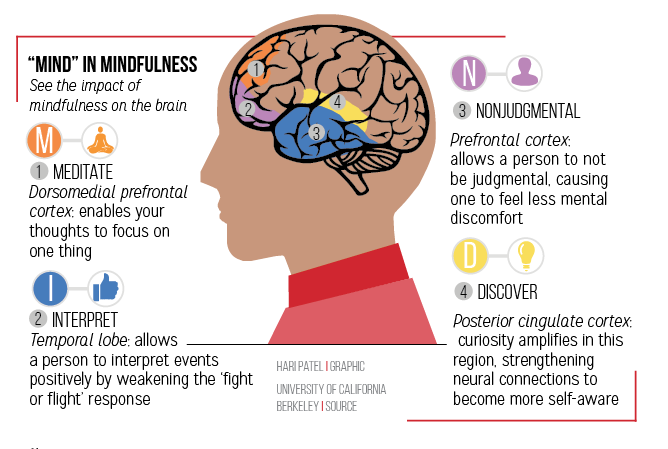
Reduction of Stress and Anxiety
Stress and anxiety are prevalent in today’s fast-paced society and can have detrimental effects on both mental and physical well-being. MBSR offers a holistic approach to managing stress and anxiety by promoting awareness, acceptance, and compassionate self-care.
How mindfulness reduces stress and anxiety
Mindfulness practice encourages individuals to observe their thoughts, emotions, and bodily sensations without judgment. Through cultivating this nonjudgmental awareness, individuals gain a greater ability to recognize and respond skillfully to stressors. Mindfulness allows them to step back from negative thought patterns and emotional reactivity, leading to a reduction in stress and anxiety levels.
Effects of mindfulness on cortisol levels
Cortisol, often referred to as the stress hormone, plays a crucial role in the body’s stress response. Chronically elevated cortisol levels can have detrimental effects on physical and mental health. Studies have shown that practicing mindfulness can lead to a decrease in cortisol levels, indicating a reduction in the body’s stress response.
Improvement in symptoms of anxiety disorders
Anxiety disorders are characterized by excessive worry, fear, and physiological symptoms such as rapid heartbeat and shortness of breath. MBSR has shown promise in alleviating the symptoms of anxiety disorders by teaching individuals to cultivate a mindful awareness of their thoughts and emotions. This awareness allows individuals to observe their anxious thoughts and respond to them with greater compassion and understanding, resulting in a reduction in anxiety symptoms.
Enhancement of Emotional Regulation
Emotional regulation refers to the ability to effectively manage and respond to one’s own emotions. It plays a crucial role in mental health and overall well-being. MBSR has been found to enhance emotional regulation by cultivating mindful awareness and promoting a compassionate and nonjudgmental attitude towards emotions.
How mindfulness enhances emotional regulation
Mindfulness practice involves observing one’s thoughts and emotions without judgment or attachment. By developing this nonjudgmental awareness, individuals can create a space between their emotions and their responses. This space allows for greater clarity and flexibility in how emotions are experienced and regulated.
Impact of mindfulness on amygdala activation
The amygdala is a key brain region involved in the processing of emotions, particularly fear and anxiety. Excessive activation of the amygdala can lead to emotional dysregulation and increased vulnerability to stress-related disorders. Studies have shown that mindfulness practice can reduce amygdala activation, resulting in enhanced emotional regulation and reduced reactivity to stressful or anxiety-provoking stimuli.
Improving emotional resilience through mindfulness practice
Emotional resilience refers to the ability to adapt and cope with stress and adversity. Mindfulness practice has been found to enhance emotional resilience by promoting the development of skills such as acceptance, self-compassion, and non-reactivity to challenging emotions. By cultivating a compassionate and nonjudgmental attitude towards oneself and one’s emotions, individuals can build emotional resilience and effectively navigate life’s challenges.
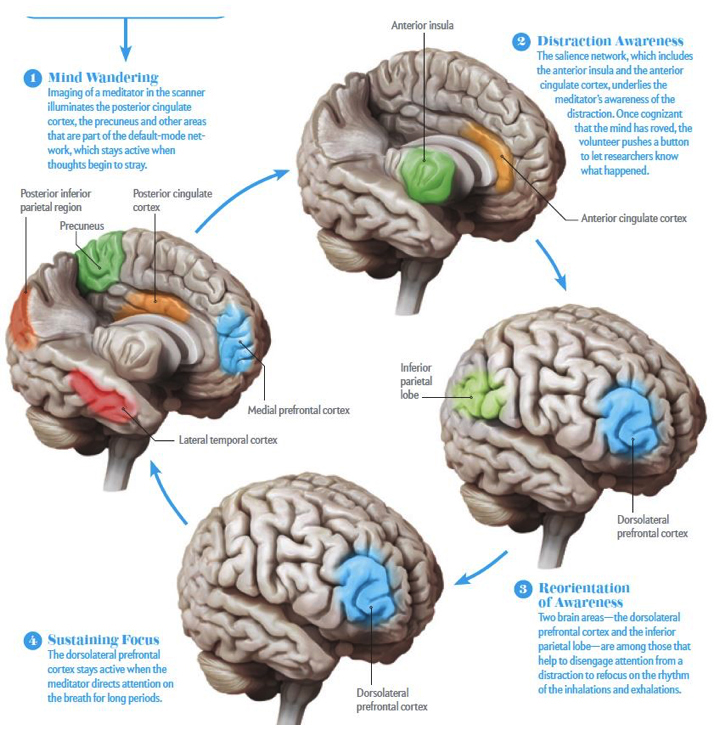
Improvement in Cognitive Functions
Cognitive functions, including attention, memory, and cognitive flexibility, play a crucial role in everyday life and overall cognitive well-being. MBSR has been found to positively impact these cognitive functions, resulting in improved cognitive performance and overall cognitive health.
Benefits of mindfulness on attention and focus
Mindfulness practice involves intentionally directing one’s attention to the present moment, which can enhance attentional control and focus. Studies have shown that mindfulness training improves attentional capacity, allowing individuals to sustain focus and better resist distractions. This improved attentional control can have significant benefits in various domains of life, including work, education, and personal relationships.
Enhancing working memory with mindfulness
Working memory refers to the brain’s ability to temporarily hold and manipulate information. It plays a crucial role in cognitive tasks such as problem-solving, decision-making, and learning. Mindfulness practice has been found to enhance working memory capacity, allowing individuals to more effectively process and retain information in their minds. This improvement in working memory can lead to enhanced cognitive performance and productivity.
Effects of mindfulness on cognitive flexibility
Cognitive flexibility refers to the ability to adapt and shift one’s thinking in response to changing circumstances or demands. It plays a crucial role in problem-solving, creativity, and adaptability. Mindfulness practice has been found to enhance cognitive flexibility by promoting the ability to observe one’s thoughts and mental processes without attachment or rigid identification. This increased cognitive flexibility allows individuals to consider multiple perspectives and generate creative solutions to problems.
Alleviation of Depression Symptoms
Depression is a common mental health condition characterized by persistent feelings of sadness, hopelessness, and a loss of interest in activities. MBSR has shown promise in alleviating depression symptoms and promoting overall well-being.
Reduction in depressive symptoms with mindfulness
Mindfulness practice can be effective in reducing depressive symptoms by promoting a compassionate and nonjudgmental attitude towards oneself and one’s emotions. Through cultivating mindful awareness, individuals develop a greater ability to observe their depressive thoughts and emotions without attaching to them or identifying with them. This creates space for a more compassionate and accepting stance towards oneself, leading to a reduction in depressive symptoms.
Role of mindfulness in preventing depression relapse
Depression can be a chronic condition, with a high risk of relapse even after successful treatment. Mindfulness-based interventions, including MBSR, have shown promise in preventing depression relapse by providing individuals with skills to recognize and respond effectively to depressive thoughts and emotions. By cultivating a nonjudgmental awareness and self-compassion, individuals can reduce the risk of relapse and maintain their overall well-being.
Improving overall well-being through mindfulness practice
In addition to alleviating depression symptoms, mindfulness practice has been found to enhance overall well-being and life satisfaction. By promoting awareness, acceptance, and self-compassion, individuals can develop a more positive and fulfilling outlook on life. This improved overall well-being can contribute to a reduced risk of depression and an increased sense of happiness and contentment.
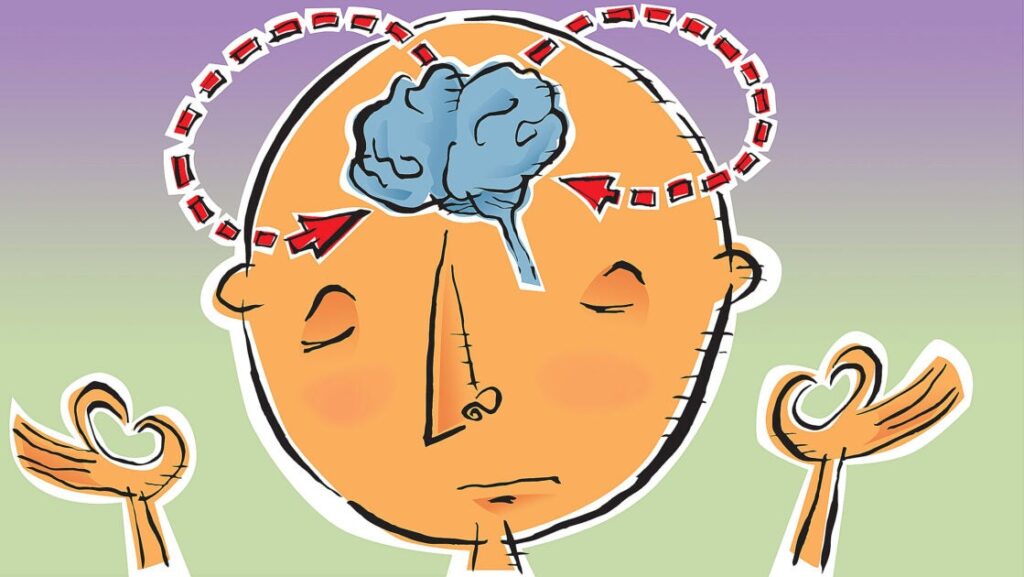
Impact of Mindfulness on Sleep Quality
Quality sleep is crucial for physical and mental health, yet many individuals struggle with sleep problems such as insomnia. Mindfulness practice has been shown to have a positive impact on sleep quality, promoting relaxation and improved sleep patterns.
Links between mindfulness and better sleep
Mindfulness practice involves relaxation techniques and a focus on the present moment, which can help individuals transition into a relaxed state conducive to sleep. By cultivating a state of mindfulness before bedtime, individuals can calm their minds and bodies, allowing for a more restful and rejuvenating sleep.
Reduction of insomnia symptoms with mindfulness
Insomnia is a sleep disorder characterized by difficulty falling asleep, staying asleep, or experiencing non-restorative sleep. Mindfulness-based interventions, including MBSR, have been found to reduce insomnia symptoms by promoting relaxation, reducing stress levels, and cultivating a more positive relationship with sleep. By incorporating mindfulness practices into their bedtime routine, individuals can improve their sleep quality and overall sleep patterns.
Promoting relaxation and improved sleep patterns
Mindfulness practice activates the body’s relaxation response, which counters the physiological arousal associated with stress and anxiety. By engaging in mindfulness exercises before bedtime, individuals can promote relaxation, calm their minds, and create an optimal environment for sleep. Improved sleep patterns, characterized by better sleep quality and duration, can have a profound impact on overall health and well-being.
Enhancement of Self-Awareness
Self-awareness is a fundamental aspect of personal growth and well-being. Mindfulness practice promotes self-awareness by cultivating a nonjudgmental and compassionate observation of one’s thoughts, emotions, and behaviors.
Developing a deeper understanding of oneself through mindfulness
Mindfulness practice encourages individuals to pause and observe their thoughts, emotions, and bodily sensations without judgment. This process of self-reflection and introspection allows individuals to develop a deeper understanding of themselves, their reactions, and their underlying patterns of behavior. By becoming more aware of their thoughts and emotions, individuals can gain insights into their values, desires, and goals, leading to a greater sense of self-awareness and personal growth.
Increasing self-compassion and self-acceptance
Mindfulness practice fosters self-compassion and self-acceptance by promoting a gentle and nonjudgmental attitude towards oneself. By observing one’s thoughts and emotions without criticism or attachment, individuals can develop greater self-compassion and self-acceptance. This compassionate self-care allows individuals to navigate life’s challenges with kindness and understanding towards themselves, leading to improved emotional well-being and overall life satisfaction.
Improvement in self-regulation and self-reflection
Self-regulation refers to the ability to manage and regulate one’s thoughts, emotions, and behaviors in line with one’s values and goals. Mindfulness practice enhances self-regulation by promoting awareness and observation of internal experiences. By cultivating the ability to observe and reflect upon one’s thoughts before reacting, individuals can respond more skillfully to challenging situations, resulting in improved self-regulation and interpersonal relationships.
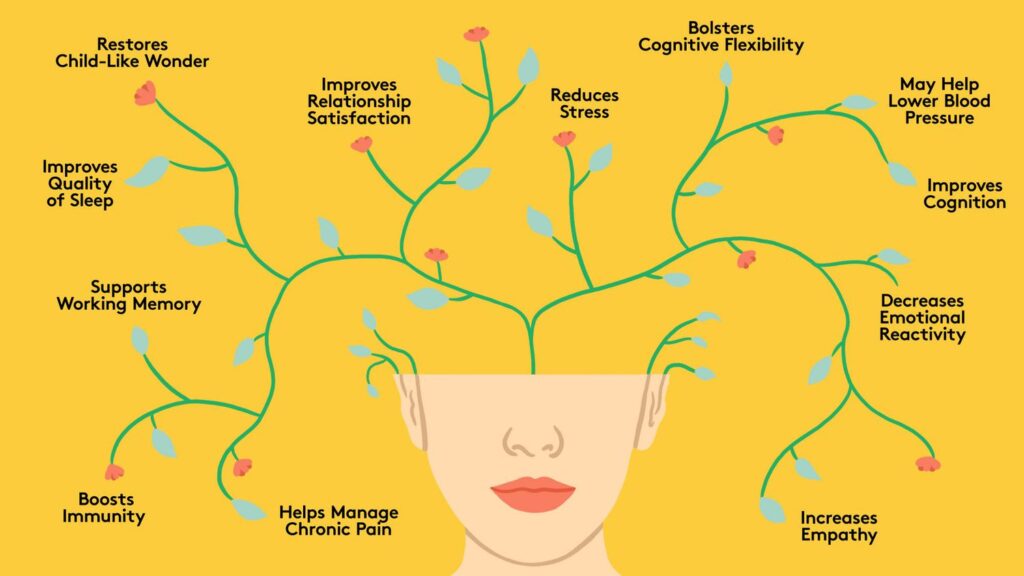
Boosting Brain Health and Resilience
Maintaining brain health and resilience is essential for overall well-being, especially as individuals age. Mindfulness practice has been shown to have long-term positive effects on the brain, protecting against cognitive decline and age-related diseases.
Long-term positive effects of mindfulness on the brain
Regular mindfulness practice has been found to promote long-term positive changes in brain structure and function. Studies have shown that individuals with extensive mindfulness practice have increased gray matter volume in brain regions associated with attention, emotional regulation, and self-awareness. Additionally, mindfulness has been found to strengthen the connections between different brain regions, enhancing the brain’s overall plasticity and resilience.
Protection against cognitive decline and age-related diseases
Cognitive decline is a natural part of the aging process, but certain lifestyle factors, including mindfulness practice, can help mitigate its effects. Research suggests that regular mindfulness practice can protect against cognitive decline and age-related neurodegenerative diseases such as Alzheimer’s disease. By promoting brain health and plasticity, mindfulness practice can enhance cognitive functioning and maintain cognitive vitality throughout the lifespan.
Building resilience and coping mechanisms with mindfulness
Resilience refers to the ability to adapt and bounce back from adversity. Mindfulness practice has been found to enhance resilience by promoting effective coping mechanisms and emotional regulation. By cultivating self-awareness, self-compassion, and non-reactivity, individuals can develop the resilience needed to navigate life’s challenges and bounce back from setbacks.
Application of Mindfulness-Based Stress Reduction
MBSR has found widespread application in various settings, including clinical, educational, and workplace environments. Its versatile nature and evidence-based efficacy make it a valuable tool for stress reduction and overall well-being.
Mindfulness-Based Stress Reduction in clinical settings
MBSR has been widely adopted within the clinical setting as a complementary intervention for various health conditions, including chronic pain, anxiety disorders, depression, and post-traumatic stress disorder (PTSD). Its non-invasive and non-pharmacological nature makes it an attractive option for individuals seeking holistic approaches to manage their health conditions.
Benefits of mindfulness for individuals with chronic illnesses
Chronic illnesses, such as cardiovascular disease, diabetes, and cancer, can greatly impact an individual’s quality of life. Mindfulness practice has been shown to alleviate symptoms and improve overall well-being for individuals with chronic illnesses. By promoting relaxation, reducing stress levels, and enhancing emotional regulation, mindfulness-based interventions can help individuals cope with the challenges of their health conditions and improve their overall quality of life.
Integrating mindfulness into daily life for stress reduction
One of the key aspects of MBSR is its integration into daily life. The principles and techniques learned through MBSR can be applied in various everyday situations to reduce stress and promote well-being. By incorporating mindfulness into daily routines, such as eating, walking, or interacting with others, individuals can develop a greater sense of presence, awareness, and peace.
Training in Mindfulness-Based Stress Reduction
To effectively practice MBSR, individuals can participate in formal MBSR programs offered by certified instructors. These programs typically consist of weekly group sessions, lasting around eight weeks, and home-based practice assignments.
Overview of Mindfulness-Based Stress Reduction programs
MBSR programs follow a structured curriculum that covers various mindfulness practices, including meditation, body scan, gentle yoga, and mindful movement. Participants engage in guided practices and receive instruction from certified MBSR instructors. The program includes group discussions to provide support and an opportunity for individuals to share their experiences and insights.
Components of mindfulness training
MBSR training typically includes several components:
-
Orientation: Participants receive an introduction to MBSR, its underlying principles, and the expectations of the program.
-
Formal Mindfulness Practices: Participants engage in guided mindfulness meditation sessions, body scan practices, and gentle yoga exercises.
-
Informal Mindfulness Practices: Participants are encouraged to incorporate mindfulness into their daily lives, bringing mindful awareness to routine activities such as eating or walking.
-
Group Discussions: Participants have the opportunity to share their experiences, reflections, and insights with the group, fostering a sense of community and support.
Finding certified mindfulness instructors and programs
To ensure the quality and authenticity of MBSR training, it is important to seek out certified instructors and programs. The Center for Mindfulness, founded by Dr. Jon Kabat-Zinn, provides a directory of certified MBSR instructors and programs. Additionally, reputable meditation centers, healthcare organizations, and universities often offer MBSR programs led by certified instructors.
Potential Side Effects and Precautions
While mindfulness practice is generally safe and well-tolerated, it is important to be aware of potential side effects and take necessary precautions, particularly for individuals with certain mental health conditions.
Possible adverse effects of mindfulness practice
In rare cases, individuals may experience adverse effects during mindfulness practice. These can include increased awareness of distressing thoughts or emotions, temporary worsening of symptoms, or feelings of discomfort or disorientation. It is important to approach mindfulness practice with openness and self-compassion and seek support from a qualified instructor if needed.
Precautions for individuals with certain mental health conditions
While mindfulness practice can be beneficial for many individuals, it may not be appropriate for those with certain mental health conditions, such as severe depression, psychosis, or post-traumatic stress disorder (PTSD). In such cases, it is crucial to consult with a healthcare professional before engaging in mindfulness practice to ensure it is safe and appropriate for the individual’s specific needs.
Importance of consulting a healthcare professional before starting
Before initiating a mindfulness practice, particularly if you have any underlying health conditions or concerns, it is important to consult with a healthcare professional. They can provide guidance, assess your individual needs, and ensure that mindfulness practice is safe and appropriate for you.
Future Directions and Research
The field of mindfulness research is continuously evolving, with ongoing studies exploring its effects on the brain, the development of new applications, and the integration of mindfulness into various settings.
Ongoing research on mindfulness and its effects on the brain
Research into the effects of mindfulness on the brain is a rapidly growing field. Ongoing studies use advanced neuroimaging techniques, such as functional MRI and electroencephalography (EEG), to explore the neural mechanisms underlying the beneficial effects of mindfulness practice. This research aims to deepen our understanding of the brain’s response to mindfulness and its long-term impact on brain structure, function, and overall well-being.
Exploring new applications and adaptations of mindfulness
Mindfulness-based interventions continue to be adapted and applied in various contexts, including schools, workplaces, and correctional facilities. Ongoing research explores the effectiveness of mindfulness-based interventions in these settings, focusing on areas such as stress reduction, emotional well-being, and interpersonal relationships. The adaptation of mindfulness programs for specific populations, such as children, adolescents, and individuals with disabilities, is also an area of active investigation.
Integrating mindfulness into educational and workplace settings
Recognizing the importance of mental health and well-being in educational and workplace settings, there is a growing interest in integrating mindfulness programs and practices. Research suggests that mindfulness-based interventions can enhance attention, resilience, and emotional well-being, leading to improved academic and work performance, decreased stress levels, and enhanced overall well-being.
Conclusion
Mindfulness-Based Stress Reduction is a powerful tool that can positively impact your brain, reduce stress and anxiety, enhance emotional regulation, improve cognitive functions, alleviate depression symptoms, enhance sleep quality, boost self-awareness, and promote brain health and resilience. By incorporating mindfulness into your daily life and participating in MBSR programs, you can cultivate these benefits and improve your overall well-being. So take a moment to pause, breathe, and embrace the present moment through mindfulness practice, and experience the positive effects it can have on your brain and life.

